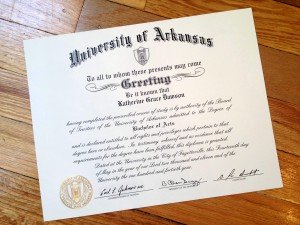Though it seems much longer, I was sitting in college classes in April 2011, just two-and-a-half years ago. My first job seemed daunting, especially when I didn’t know what to expect. What I quickly learned is to unlearn much of what I knew about succeeding in college. Here are four things many students must unlearn in their first real-world jobs.
1) No one is going to give you an assignment.
Succeeding in college classes is formulaic: receive an assignment, break it up into personal deadlines, tackle each step at a time. There isn’t much guesswork.
In advertising, like most industries, each project is a brand-new challenge and requires a new set of ideas and solutions.
Our first step is to understand exactly what the client needs. For example, a client may ask for a new website, but after more discussion, we learn they really need a more cohesive brand, which may or may not include a website renovation.
The assignment is always the same: to increase positive awareness of our clients’ brands, using any tools necessary.
2) You don’t get points for trying.
In some of my classes, the professor would set “milestones” every couple weeks while we were completing a major project. These regular check-ins proved to my professor that I was working really hard. My final grade was often the sum of grades I earned at each milestone, no matter whether the end result succeeded or failed.
Stone Ward Principal #19 is: do not confuse effort with results. Clients turn to us for guidance and solutions. If we are unable to produce quality results, they don’t care how many hours we worked, if our media research was spot on or if we used a stellar tagline…and they’ll take their business elsewhere.
3) BS-ing won’t get you very far.
In college, I mastered writing pages and pages about a single topic. I would organize essays so each section seemed different from the last. I would cite the same information from multiple sources to show I did a lot of research.
Our clients are constantly re-evaluating our services, so we cannot disguise poor results. If we are not able to land media appearances, drive visits to their website or increase their page likes, we find a new strategy.
Last month, Arkansas Business Editor Gwen Moritz wrote that companies try to downplay their losses in quarterly earnings statements by couching their numbers in good light or picking misleading measurements. When companies (and agencies) have good results, their reports are short, succinct and communicate success in the first sentence. No BS.
4) No one is grading you.
Nothing reflects college better than a transcript. If a student got an A on his exam, no one cares if he crammed for it. If a student wants a group project done right, she has to do it herself.
In the real world, we can’t pull an all-nighter to produce our best work, nor can anyone single-handedly complete all the elements of a campaign. No individual can manage, research, design, produce and develop better than a team of specialists.
Sometimes we get promotions or raises, but in general, our reward is being able to find a path that’s good for our client, our customers and ourselves. There’s no letter grade for that because we are the only ones who can judge whether it’s a good path. Our measurements aren’t as concrete as a 96 percent on an exam, but they are infinitely more rewarding.


